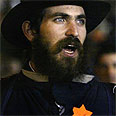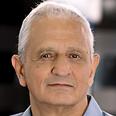From time to time, an IDF general, or Knesset member, or Supreme Court judge, will stand up and give the settlers a good verbal hug.
“We can argue with one or another of their actions,” goes the argument, “but about one thing there is no argument to be had: these people are absolutely salt of the earth.”
When I hear this overused phrase, mostly by someone with a large kippa, sometimes a beard, I start to wretch.
The phrase “salt of the earth” refers to one person only: Jesus. And as far as I know (and I’d be happy to be corrected), Jesus does not appear in Jewish sources.
The phrase comes from the New Testament. The Gospel of Matthew (ch. 4-5) says that Jesus gathered “all the sick that were taken with divers diseases and torments, and those which were possessed with devils, and those which were lunatic, and those that had palsy; and he healed them”. At a stretch, these words just might fit the hilltop youth.
But what about the verses that follow—“Blessed are the meek, Blessed are they who hunger and thirst after righteousness, Blessed are the peacemakers—ye are salt of the earth.” How exactly do they apply?
Humble? Starving? Peace makers? No one, not even the most strident settler, would use these words to describe the hard core, religious element of the West Bank settlement movement.
The thing that bothers me here is not the incorrect use of the phrase. It is an approach that says that Israelis who live over the Green Line are necssarily people of high standing, a quality group somehow deserving of special treatment.
All Israeli citizens are equal, but they are worth just a bit extra. All residents of the territories are equal, but they are just a bit more equal. If anyone thinks that Sharon’s disengagement plan, or attorney Talia Sasson’s recommendations has changed this special status, he is dreaming.
Several days ago I visited Checkpoint 105, south of Tul Karm, the meeting point of the separation fence, a road linking Tul Karm to its surrounding agricultural fields, the road to Kfar Jabra, and the road that leads to two settlements: Einav and Avnei Hefetz.
By mistake, the fence recently separated Jabra from the West Bank. The mistake will soon be corrected, at a cost of millions of shekels, but this is only a minor cost.
The major cost here is the digging of a tunnel underneath the Israeli road for Palestinian traffic, at a cost of 13 million shekels (USD 2.9 million). If there was no need for quick access to the center of the country for the two settlements, it is questionable whether the country would invest any money at all here.
The new checkpoint will have one fast lane for security forces; a second fast lane for settlers, and a third, for Arabs.
This is the blueprint for all new checkpoints currently under construction by the defense ministry. Sometimes, with minor alterations, but the principle remains: Arabs wait, Jews speed on through.
Of course, there is security logic to separation. But there’s more: different laws for different groups. Settlers are salt of the earth, Palestinans are dust of the earth. In South Africa, this was called apartheid.
The settler leadership is conducting a double battle at the moment. One, to prevent the evacuation of settlements in Gaza and northern Samaria. The second is to protect their special political, moral, and financial status in Israeli society.
These two battles are interconnected. For whatever reason, as painful as it might be, there is no way to trade one for the other. Both processes must happen simultaneously.
The party who most fails to understand this is the courts. Again and again, the salt of the earth settlers are being arrested, and again and again judges are being merciful towards them and releasing them—no enforcement, no punishment.
Most recently, Avri Ran, a settler from the Gevaot Olam farm standing trial on a long list of charges that he beat Palestinians. The judges tried twice to free Ran, but after a supreme effort, the army and police managed to prevent his release. At least as of this writing.

















